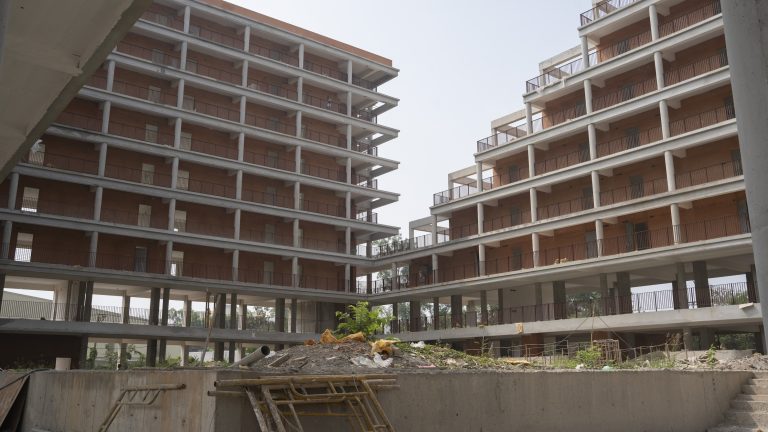Kim Yong-rae is the CEO of Speefox, South Korea’s biggest manufacturer of capacitors, and he thinks robots are key to the company’s survival. On his factory floor, free-standing machines squeal as they spit out gleaming sheets of aluminum that roll into coils.
The air is filled with the rhythmic thud of stamping and the buzzing of machinery moving continuously, on the ground and overhead. Capacitors are essential to almost every electronic device, and these will end up in thousands of smartphones, cameras, and home appliances.
“Throughout our history, we’ve always had to find ways to stay ahead,” Kim told Rest of World. “Automation is the next step in that process.”
Speefox’s factory is 75% automated, representing South Korea’s continued push away from human labor. Part of that drive is labor costs: South Korea’s minimum wage has climbed, rising 5% just this year.
But the most recent impetus is legal liability for worker death or injury. In January, a law came into effect called the Serious Disasters Punishment Act, which says, effectively, that if workers die or sustain serious injuries on the job, and courts determine that the company neglected safety standards, the CEO or high-ranking managers could be fined or go to prison.
Experts and local media say that the law has shaken the heavy industry and construction sectors. Along with pushing the companies to invest to make workplaces safer, they point out, it’s triggered a ramp-up of automation in order to require fewer workers — or, ideally, none at all.
“Companies are moving to reduce human labor,” Jung Jin-woo, a Seoul National University of Science & Technology professor who studies occupational safety and has been following businesses’ reaction to the law, told Rest of World. “There’s also hesitation to jump into any high-risk projects.”
The law has companies preventatively “rushing to implement safety solutions using artificial intelligence, ICT, and robots,” the Aju Business Daily reported on the eve of its promulgation. The CEO of the Korea unit of Universal Robots, the Denmark-headquartered maker of robot arms, said in an interview that the onset of the law sparked a rise in demand for the company’s robots used in manufacturing and construction. The South Korean firm A-Robotics has been busy promoting the safety of its unmanned forklifts; Huawei Korea and Sejong Telecom have both announced plans to produce 5G-based smart factory monitoring systems, pitched at helping companies prevent accidents.
The law was initially hailed as a boon for workers’ rights. But companies, mostly manufacturers and construction firms, pushed back, arguing that criminalizing management for on-the-ground practices was unfair and would harm the business climate. Critics have also argued that the law is too vaguely worded and that companies can’t be sure exactly what constitutes culpability and how to avoid it.
“The law is a huge issue in business right now,” said Kim Hyo-jin, a managing director at Speefox and Yong-rae’s daughter. “Fortunately for us, we were already automating, so when the law came, we were ready.”

Speefox’s factory, a block of concrete and steel amid idyllic rice farms 90 minutes south of Seoul, is located in Icheon, an industrial city where a number of high-profile disasters have occurred over the past couple of years. In June of last year, a firefighter died while working to extinguish a blaze at a warehouse operated by SoftBank-backed e-commerce giant Coupang. The previous year, 38 workers died in a fire at a construction site. (Official data on industrial accidents is patchy, due to strict requirements for categorizing a workplace incident.)
These mishaps regularly make the news in South Korea and spur national debate on how, in a country with some of the world’s most advanced technology, such accidents continue to happen. It was a motivator for the legislature to pass the Serious Disasters Punishment Act, said Lee Joon-won, an expert on system safety at Soongsil University in Seoul.
“Repeated, basic safety accidents are a big blemish on a country with a per capita income of about $30,000,” Lee said. “It’s natural that companies pursue profit, but they have to do so safely.”
"Repeated, basic safety accidents are a big blemish on a country with a per capita income of about $30,000."
South Korea’s flagship manufacturers, shipbuilders and automakers, have long been moving toward high automation levels to keep costs low and compete with global rivals. Now, second-tier manufacturers like Speefox are doing the same, experts told Rest of World.
The government has pledged to help companies improve their safety standards. The Ministry of Employment and Labor has plans to dispatch officials for on-site inspection and supervision of workplaces. “What is more important than purchasing new equipment is for companies to recognize the importance of securing safety, to prevent industrial accidents and thus establish and implement a safety and health management system,” the ministry said in response to questions from Rest of World. “It is a fundamental responsibility of the state to protect the precious lives and safety of working people.”
South Korea has seen this before: the urge to seek technology-driven solutions to human issues. To address labor shortages and accidents on farms, for example, the government has pushed smart farming technologies and is currently aiming to build 30,000 smart factories this year. But what tech-minded solutions can do, experts point out, is shift responsibility for the original problem from companies to the systems they employ.
Speaking to Rest of World, Kim Sung-hee, a professor at the Korea University Graduate School of Labor Studies, was concerned that the turn to automation could be a way for companies to avoid the greater demands of overhauling their safety practices. “If these technologies are introduced to minimize human error or worker negligence, that could reduce danger and have a preventative effect,” Kim said. “But it’s not desirable to have management and corporations avoiding responsibility and goes against the spirit of the law.”
Kim Hyo-jin, Speefox’s managing director, has higher hopes: that the turn toward technology can reduce tension in South Korea’s high-pressure manufacturing sector. “There has always been this militaristic culture in manufacturing. Because you can have no defects, you always have to be hyperaware. Maybe now people can relax a bit.”
The company has survived a shift before. At a time when many small- and mid-sized South Korean manufacturers were relocating overseas for cheaper labor or shutting down altogether, Kim and his team figured out how to produce their own laminate — Polyethylene Terephthalate (PET) film applied on top of an aluminum coil — for the capacitors, which lowered their material costs and gave them an edge in the market.
The last stop in the production process takes place in a hushed room, in contrast to the rest of the factory. There, a human worker inspects each capacitor case under brilliant fluorescent lighting. Next, the company aims to replace these human inspectors, too, with machine vision cameras. The volatility of high-tech manufacturing has taught Kim Hyo-jin to keep pushing toward the future, she said. “In this kind of business, ultimately, it’s one innovation that can determine whether or not you survive.”



